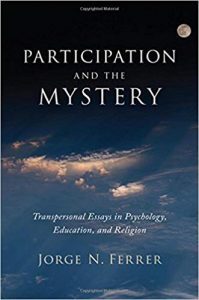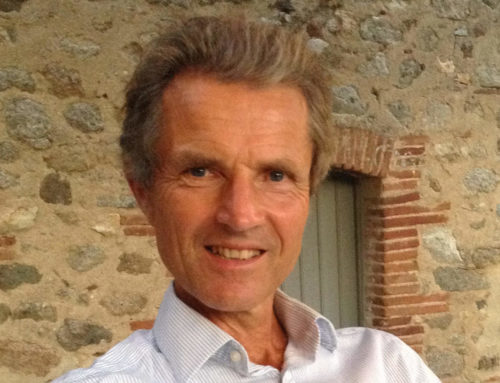Book review by David Lorimer
PARTICIPATION AND THE MYSTERY
Jorge Ferrer (SMN)
SUNY Press, 2017, 376 pp.
ISBN: 978-1-4384-6487-9
Jorge Ferrer is Professor of East-West Psychology at the California Institute of Integral Studies, author of the seminal Revisioning Transpersonal Theory: A Participatory Vision of Human Spirituality, and co-editor of The Participatory Turn: Spirituality, Mysticism, Religious Studies, both of which were reviewed in these pages. Jorge is the foremost theorist of participatory spirituality and, as such, these brilliant new essays are required reading for anyone seriously interested in spirituality, psychology, religion, mysticism, philosophy of science and education. There are nearly 100 pages of notes and references. The three parts are devoted to transpersonal psychology, integral education and some reflections on spirituality and religion, particularly a critical engagement with the work of Stan Grof and Ken Wilber.
The first essay on participatory spirituality defines its approach as emerging from ‘human co-creative participation in an undetermined mystery or generative power of life, the cosmos, or reality’ (p. 10) – in an appendix he explains his use of the term undetermined to distinguish it from indeterminate and to leave open the possibility of determinacy and indeterminacy within the mystery. Likewise, he has substituted the word ‘mystery’ for ‘spirit’. The participatory approach denies the existence of pre-given ultimates and/or single traditions but is also critical of post-modern reduction of religion to a cultural-linguistic artefact – this means that the approach is essentially enactive and co-creative. Jorge provides a useful map of participatory spirituality with different forms of co-creation – transpersonal, interpersonal and intrapersonal, each with its principles, challenges, tests, regulative goals and direction. (p. 12)
This provides an excellent theoretical framework as well as three practical tests that can be applied to any spiritual tradition: the egocentrism test relating to the overcoming of self-centredness in practitioners, the dissociation test addressing the extent of fully embodied integration, and the eco–socio-political test ‘assessing the extent to which spiritual systems. The ecological balance, social and economic justice, religious and political freedom, class and gender equality, and other fundamental human rights.’ (p. 203) I agree that this approach invites ‘a more nuanced, contextual, and complex evaluation of religious claims’ based on results rather than any a priori conditions.
The second essay on transpersonal psychology, science and the supernatural is a penetrating analysis and critique of the tendency within psychology to try to align itself with science by claiming a metaphysical neutrality or agnosticism. It is apparent that Harris Friedman, editor of the Wiley-Blackwell Handbook of Transpersonal Psychology, is trying to restrict the field to exclude the existence of transcendent realities, which is an implicit acknowledgement of orthodox naturalism and a denial that science also contains metaphysical assumptions; indeed, naturalism is itself a metaphysic. Jorge sees this in terms not only of Western ethnocentrism, but what he calls epistemic colonialism that critically filter traditional supernatural claims and claim to be the final arbiter on their validity. Jorge argues for a critical but sympathetic engagement with other worldviews and ways of knowing. He is also right in criticising what he calls cognicentrism, both in education generally and psychology particularly. More on this below. He steers a middle course between both perennialism and scientism, both of which commit transpersonal psychology to a single metaphysical worldview – either transcendentalist or naturalistic. The participatory approach is open to multiple metaphysical possibilities and state-specific insights (p. 62).
The chapters on integral education assert that modern Western education ‘emphasises the development of the mind’s rational and intellectual powers, paying little attention to the maturation of other ways of knowing.’ (p. 55) This is a good definition of cognicentrism and highlights the lack of development in kinematic, emotional, aesthetic, intuitive and spiritual intelligences. In this respect, Jorge could have drawn on the work of Iain McGilchrist on the implications of left and right hemisphere thinking for culture, but this reference is missing from his coverage. Integral education is also transformative and demanding at different levels. Jorge describes the work of Marina Romero and Ramon Albareda addressing body, vital, heart, mind and consciousness in a co-creative process of unfolding learning and enquiry. This makes very interesting reading, especially the incorporation of the vertical dimension reconnecting education with transformation and spirituality. As Jorge points out, expanded intellectual understanding does not equate with genuine integral knowledge; the former can remain lopsided and exclusively mind-centred.
This leads on to the incorporation of embodied spiritual practices and the overcoming of disassociation from the physical and alienation from nature and the feminine. Embodied spirituality takes in all human dimensions as equal partners; its goal is integration rather than sublimation, which includes listening to the body as a source of spiritual insight, the resacralisation of nature, sexuality and sensuous pleasure, and rediscovering the mystery in its immanent manifestation rather than simply seeking the transcendent beyond the body and the world. All this is in the service of liberation. These insights are incorporated in the chapter on teaching mysticism from a participatory perspective, perhaps the most wide-ranging methodology I have read about anywhere and which is at once integral, experiential and transformative. These methods are further elaborated in a chapter on embodied spiritual enquiry as a radical approach to contemplative education.
The critical chapters on Stan Grof and Ken Wilber provide readers with a useful participatory view by questioning the privileging of a non-dual monistic metaphysics with a pre-given ultimate spiritual reality. Jorge’s approach, as indicated above, is enactive, co-creatively bringing forth new insights which are bound to be culturally conditioned in some respects. He uses the analogy of the ocean of emancipation having different shores, which also allows for new evolutionary spheres to develop, which do not apply a hierarchical scheme, as advanced by Wilber. As Tim Freke points out in Soul Story (see his article and my review in the last issue), these realms must have developed alongside cultural evolution. The final chapter discusses religious pluralism and the future of religion, with a number of scenarios that let a thousand spiritual flowers bloom, intrinsically valuing diversity and mutually respect. Thus one can achieve a sense of belonging to a common spiritual family committed to spiritual individuation and responsible transformation of the world in ecological, sociological and political dimensions.
One other concept new to me was that of ‘open naturalism’ as a result of realising that the dichotomy of naturalistic/supernaturalistic is itself problematic and arises from the theology of mediaeval Christianity. Modern scientific naturalism is particularly committed to rejecting any supernatural causes, agents or principles. Open naturalism allows a more expansive view free from materialism and reductionism and is therefore open to the plausibility of subtle dimensions of reality. Similarly, Jorge questions the sharp distinction between transcendent and immanent, preferring the use of the word subtle. I found it useful to question these widely accepted dichotomies as a way of loosening up categories. After all, the participatory integrates subjective and objective in its approach. Overall, the volume is highly stimulating and thought-provoking in articulating a participatory perspective across a number of disciplines and challenging us to become more integral, embodied and responsible.
Buy Participation and the Mystery here.
